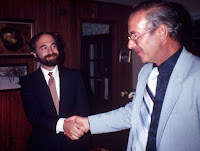Then a few weeks ago we saw Terrence McNally’s Lips Together, Teeth Apart at the Westport Country Playhouse, portraying two heterosexual couples vacationing at a home on Fire Island, in the middle of a gay community. It is a play that is constantly on an uneasy edge, the problems of the two couples acting out their aberrant behavior contrasted to the high-spirited, better adjusted gay community, off stage. But central to the play is the paranoia of how AIDS was thought to be transmitted at the time, symbolized by the couples’ dramatic fear of going into the pool (on stage) -- an obsession of twenty years ago when the play was written. Nonetheless, the play is still a compelling tragicomic drama and wonderfully staged at the beautifully restored Westport Country Playhouse.
A twenty year leap forward brings me to reading Jonathan Tropper’s Everything Changes. Here is a very contemporary novel by a thirty-something author about relationships between fathers and sons, and male female relationships. Tropper’s idiosyncratic characters (in particular, the protagonist’s father) at times reminds me a little of Richard Russo’s and Anne Tyler’s. Trooper’s writing can be very funny but sensitive at the same time. These are the two paragraphs that grab you and pull you into the novel:
Life, for the most part, inevitably becomes routine, the random confluence of timing and fortune that configures its components all but forgotten. But every so often, I catch a glimpse of my life out of the corner of my eye, and am rendered breathless by it. This is no accident. I made this happen. I had a plan.
I am about to fuck it all up in a spectacular fashion.
It was quite a contrast reading Anita Brookner’s Strangers, perhaps the most interior novel I’ve read in some time, most of it taking place in the mind of the 72 year old protagonist, a retired banker and confirmed bachelor, who feels he may be missing something not sharing his life with a woman. By chance he meets one of his old lovers (he hasn’t had many), now aged and frail, but one for whom he thinks he still has feelings. He also meets a woman on a flight to Venice, younger than he. Much of the novel is a debate (in his mind) of the advantages or disadvantages of being with one or the other or neither. Brookner’s writing is timeless, meticulously exacting, set mostly in London, but a London that seems to exist merely in some recent time. It is also about aging and finding meaning in life after a lifetime of work:
His reading now was confined to diaries, notebooks, memoirs, anything that contained a confessional element. He was in search of evidence of discomfiture, disappointment, rather than triumph over circumstances. Circumstances, he knew, would always overrule. Those great exemplars of the past, the kind he had always sought in classic novels, usually finished on a note of success, of exoneration, which was not for him. In the absence of comfort he was forced to contemplate his own failure, failure not in worldly terms but in the reality of his circumscribed life. He knew, rather more clearly than he had ever known before, that he had succeeded only at mundane tasks, that he had failed to deliver a reputation that others would acknowledge. Proof, if proof were needed, lay in the fact that his presence was no longer sought, that, deprived of the structure of the working day, he was at a loss, obliged to look for comfort in whatever he could devise for himself. His life of reading, of walking, was invisible to others: his friendships, so agreeable in past days, had dwindled, almost disappeared. Memories were of no use to him; indeed, even memory was beginning to be eroded by the absence of confirmation. As to love, that was gone for good. Whatever he managed to contrive for himself would not, could not, be construed as success.

Finally, yesterday, we saw the NYC preview performance of Stephen Sondheim’s great musical, Follies. This is a show I failed to see when it opened in 1971 or any of the revivals and have been waiting, waiting for the opportunity. Sondheim is the last surviving composer of another era. Talk about historical markers. This is Sondheim’s tribute to various eras of Broadway’s past and it has some of his best known songs, too many to mention, including one that is perhaps my very favorite, Losing My Mind.
This new Broadway production, coming via the Kennedy Center, is spectacular, the kind of show no longer written for Broadway. It was Sondheim’s first musical as both composer and lyricist and every line, every word is delicious. The Broadway production includes some of Broadway’s luminaries, Bernadette Peters, Danny Burstein, Jan Maxwell, Ron Raines, and Elaine Page. Each brings the house down with some of Sondheim’s most iconic numbers. The juxtaposition of their ghosts from eras past is particularly evocative. Here is a two and half hour production which seems to pass in minutes, portraying innocent and happier times past, lost loves, regrets and heartbreak.
 .
.










